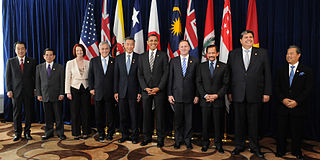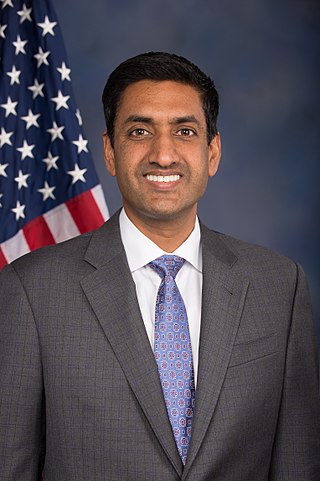Related Research Articles
A tariff is a tax imposed by the government of a country or by a supranational union on imports or exports of goods. Besides being a source of revenue for the government, import duties can also be a form of regulation of foreign trade and policy that taxes foreign products to encourage or safeguard domestic industry. Protective tariffs are among the most widely used instruments of protectionism, along with import quotas and export quotas and other non-tariff barriers to trade.

Free trade is a trade policy that does not restrict imports or exports. In government, free trade is predominantly advocated by political parties that hold economically liberal positions, while economic nationalist and left-wing political parties generally support protectionism, the opposite of free trade.

Joseph Eugene Stiglitz is an American New Keynesian economist, a public policy analyst, and a full professor at Columbia University. He is a recipient of the Nobel Memorial Prize in Economic Sciences (2001) and the John Bates Clark Medal (1979). He is a former senior vice president and chief economist of the World Bank. He is also a former member and chairman of the Council of Economic Advisers. He is known for his support for the Georgist public finance theory and for his critical view of the management of globalization, of laissez-faire economists, and of international institutions such as the International Monetary Fund and the World Bank.
Rogernomics were the neoliberal economic reforms promoted by Roger Douglas, the Minister of Finance between 1984 and 1988 in the Fourth Labour Government of New Zealand. Rogernomics featured market-led restructuring and deregulation and the control of inflation through tight monetary policy, accompanied by a floating exchange-rate and reductions in the fiscal deficit.

Import substitution industrialization (ISI) is a trade and economic policy that advocates replacing foreign imports with domestic production. It is based on the premise that a country should attempt to reduce its foreign dependency through the local production of industrialized products. The term primarily refers to 20th-century development economics policies, but it has been advocated since the 18th century by economists such as Friedrich List and Alexander Hamilton.
A subsidy or government incentive is a type of government expenditure for individuals and households, as well as businesses with the aim of stabilizing the economy. It ensures that individuals and households are viable by having access to essential goods and services while giving businesses the opportunity to stay afloat and/or competitive. Subsidies not only promote long term economic stability but also help governments to respond to economic shocks during a recession or in response to unforeseen shocks, such as the COVID-19 pandemic.

Protectionism, sometimes referred to as trade protectionism, is the economic policy of restricting imports from other countries through methods such as tariffs on imported goods, import quotas, and a variety of other government regulations. Proponents argue that protectionist policies shield the producers, businesses, and workers of the import-competing sector in the country from foreign competitors and raise government revenue. Opponents argue that protectionist policies reduce trade, and adversely affect consumers in general as well as the producers and workers in export sectors, both in the country implementing protectionist policies and in the countries against which the protections are implemented.
Race to the bottom is a socio-economic phrase to describe either government deregulation of the business environment or reduction in corporate tax rates, in order to attract or retain economic activity in their jurisdictions. While this phenomenon can happen between countries as a result of globalization and free trade, it also can occur within individual countries between their sub-jurisdictions. It may occur when competition increases between geographic areas over a particular sector of trade and production. The effect and intent of these actions is to lower labor rates, cost of business, or other factors over which governments can exert control.

Globalization and Its Discontents is a book published in 2002 by the 2001 Nobel laureate Joseph E. Stiglitz. The title is a reference to Freud's Civilization and Its Discontents.
Economic nationalism or nationalist economics is an ideology that prioritizes state intervention in the economy, including policies like domestic control and the use of tariffs and restrictions on labor, goods, and capital movement. The core belief of economic nationalism is that the economy should serve nationalist goals. As a prominent modern ideology, economic nationalism stands in contrast to economic liberalism and economic socialism.
The Licence Raj or Permit Raj is a pejorative for the system of strict government control and regulation of the Indian economy that was in place from the 1950s to the early 1990s. Under this system, businesses in India were required to obtain licences from the government in order to operate, and these licences were often difficult to obtain.
Flexicurity is a welfare state model with a pro-active labour market policy. The term was first coined by the social democratic Prime Minister of Denmark Poul Nyrup Rasmussen in the 1990s.

The Trans-Pacific Partnership (TPP), or Trans-Pacific Partnership Agreement (TPPA), was a proposed trade agreement between 12 Pacific Rim economies: Australia, Brunei, Canada, Chile, Japan, Malaysia, Mexico, New Zealand, Peru, Singapore, Vietnam, and the United States. In the United States, the proposal was signed on 4 February 2016 but not ratified as a result of significant domestic political opposition. After taking office, the newly elected President Donald Trump formally withdrew the United States from TPP in January 2017, therefore ensuring the TPP could not be ratified as required and did not enter into force. The remaining countries negotiated a new trade agreement called Comprehensive and Progressive Agreement for Trans-Pacific Partnership, which incorporated most of the provisions of the TPP and which entered into force on 30 December 2018.
Capital strike is the practice of businesses withholding any form of new investment in an economy, in order to attain some form of favorable policy. Capital strikes may arise from the determination that return on investment may be low or nonexistent or from the belief that by withholding investment certain political or economic changes may be achieved—or from a combination of the two. Capital strikes can be economy-wide, or take place in a specific industry.
Tariffs have historically served a key role in the trade policy of the United States. Their purpose was to generate revenue for the federal government and to allow for import substitution industrialization by acting as a protective barrier around infant industries. They also aimed to reduce the trade deficit and the pressure of foreign competition. Tariffs were one of the pillars of the American System that allowed the rapid development and industrialization of the United States. The United States pursued a protectionist policy from the beginning of the 19th century until the middle of the 20th century. Between 1861 and 1933, they had one of the highest average tariff rates on manufactured imports in the world. However American agricultural and industrial goods were cheaper than rival products and the tariff had an impact primarily on wool products. After 1942 the U.S. began to promote worldwide free trade, but after the 2016 presidential election has gone back to protectionism.
Protectionism in the United States is protectionist economic policy that erects tariffs and other barriers on imported goods. In the US this policy was most prevalent in the 19th century. At that time it was mainly used to protect Northern industries and was opposed by Southern states that wanted free trade to expand cotton and other agricultural exports. Protectionist measures included tariffs and quotas on imported goods, along with subsidies and other means, to restrain the free movement of imported goods, thus encouraging local industry.

Rohit Khanna is an American politician and lawyer serving as the U.S. representative from California's 17th congressional district since 2017. A member of the Democratic Party, he defeated eight-term incumbent Democratic Representative Mike Honda in the general election on November 8, 2016, after first running for the same seat in 2014. Khanna also served as the deputy assistant secretary in the United States Department of Commerce under President Barack Obama from August 8, 2009, to August 2011.
Economic democracy is a socioeconomic philosophy that proposes to shift ownership and decision-making power from corporate shareholders and corporate managers to a larger group of public stakeholders that includes workers, consumers, suppliers, communities and the broader public. No single definition or approach encompasses economic democracy, but most proponents claim that modern property relations externalize costs, subordinate the general well-being to private profit and deny the polity a democratic voice in economic policy decisions. In addition to these moral concerns, economic democracy makes practical claims, such as that it can compensate for capitalism's inherent effective demand gap.
The Global Markets Action Plan (GMAP) was Prime Minister Stephen Harper's government strategy to generate employment opportunities for Canadians by expanding Canadian businesses and investment in other countries in a highly competitive global environment.
Progressive capitalism is an approach to capitalism that seeks to improve the current neoliberal American capitalism that emerged in 1980. Progressive capitalism aims to improve economic results through four defining beliefs, namely the vital role businesses play in the economy by creating jobs, fostering innovation, enabling voluntary exchange, and providing competitive goods and services; the recognition of the important role public goods, public institutions, public services and public infrastructure play in supporting businesses including: research, schools, health care, social insurance, taxation, labor law and regulation of markets; the need for the state to be involved in design and oversight of the playing field; and the integration of social justice, stewardship of natural resources and responsibility to all major stakeholders. It is being advocated by Ro Khanna and Joseph Stiglitz.
References
- ↑ Clift, Ben; Woll, Cornelia (April 2014). "Economic patriotism: reinventing control over open markets". Journal of European Public Policy. 19 (3): 307–323. doi: 10.1080/13501763.2011.638117 . ISSN 1350-1763.
- ↑ "Le patriotisme économique, mirage dans un désert de croissance". LEFIGARO (in French). 17 March 2006. Retrieved 23 February 2023.
- ↑ Hockett, Robert (5 June 2023). "What is The New Economic Patriotism? Hint: It's About the Production". Forbes. Retrieved 19 June 2023.
- ↑ Yglesias, Matthew (4 June 2019). "Elizabeth Warren's latest big idea is 'economic patriotism'". Vox. Retrieved 23 February 2023.
- ↑ "Obama touts 'economic patriotism' in Virginia campaign swing". Reuters. 27 September 2012. Retrieved 23 February 2023.
- ↑ "America needs a New Economic Patriotism plan". The Boston Globe. October 2022. Retrieved 23 February 2023.
- ↑ "Giants Built on the Fundamentals of Economic Patriotism". Warsaw Institute. 18 May 2020. Retrieved 23 February 2023.
- ↑ Hopkins, Valerie; Varenikova, Maria (22 February 2022). "Ukraine's president calls up reserves, urging his compatriots to fight for their country". The New York Times. ISSN 0362-4331 . Retrieved 5 March 2023.
- ↑ Bump, Philip (17 July 2014). "'Economic patriotism': Explaining the vague, finger-wagging, immortal phrase". The Washington Post. Retrieved 24 May 2018.
- ↑ Safire, William (19 September 1985). "Opinion | ESSAY; The Year of Dee-fense". The New York Times. ISSN 0362-4331 . Retrieved 1 April 2023.
- ↑ Shogan, Robert (12 April 1991). "Economy Focus of Tsongas' 1992 Bid : Election: Ex-senator says Democratic Party must change, form ties with business. He will announce candidacy for White House this month". Los Angeles Times. Retrieved 1 April 2023.
- ↑ "Obama touts 'economic patriotism' in Virginia campaign swing". Reuters. 27 September 2012. Retrieved 23 February 2023.
- ↑ Ortega, Andrés (9 February 2021). "Economic patriotism: understandable but dangerous". Elcano Royal Institute. Retrieved 5 March 2023.
- ↑ "The Canard of 'Economic Patriotism'". National Review. 17 July 2014. Retrieved 5 March 2023.
- ↑ "No to 'economic patriotism' - Business - International Herald Tribune". The New York Times. 4 July 2006. ISSN 0362-4331 . Retrieved 5 March 2023.
- ↑ Bennhold, Katrin (5 July 2007). "News Analysis: Is Sarkozy an old-style Gaullist in disguise?". The New York Times. ISSN 0362-4331 . Retrieved 5 March 2023.